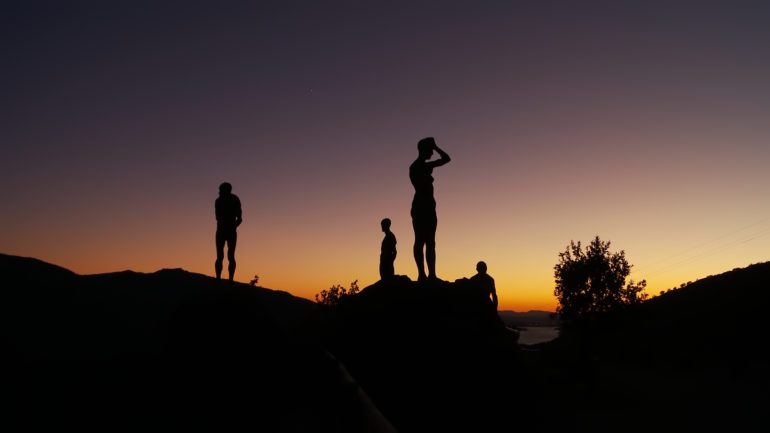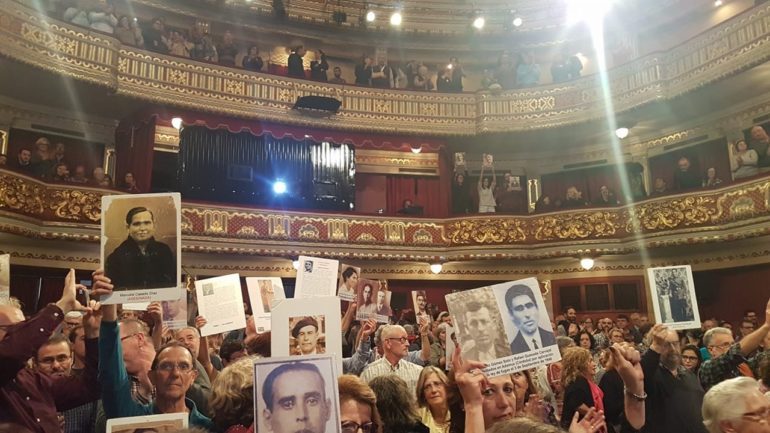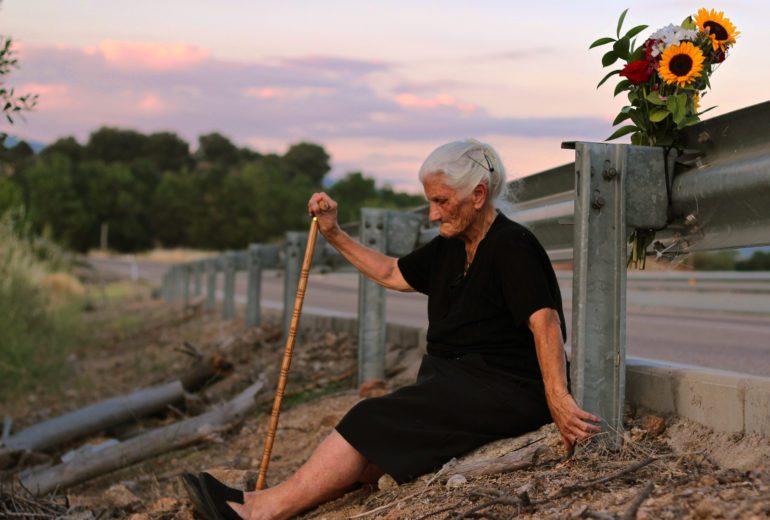Almodovar-Backed ‘The Silence of Others’ Gets International Trailer (EXCLUSIVE)
By John Hopewell
LOS ANGELES (Variety.com) – MADRID — “I was six-years-old when they came for my mother. People from the town, Franco supporters,” narrates an old lady, the white-haired, black-dressed Maria Martín, nearly 80 years later, as she is filmed at the beginning of “The Silence of Others” laying simple flowers by the side of a country road.
Executed during Spain’s Civil War, the dead body of Martín’s mother’s was found the next day by the side of the road, and buried naked in a mass grave outside María’s village, which is now under the road. Martín’s painstaking efforts down the years to persuade authorities to exhume the 25 bodies buried in that grave have got nowhere.
Executive produced by Pedro and Agustín Almodóvar and Esther García for El Deseo, and co-written, produced and directed by Almudena Carracedo and Robert Bahar, “The Silence of Others” examines Martín’s tragedy from both historical and deeply relatable human angles. Variety has had exclusive access to its international trailer.
It’s now thought that over 100,000 people were executed in cold blood during and in the aftermath of Spain’s 1936-39 Civil War, as Francisco Franco attempted to turn his military coup into a ruling regime.
But monuments to the dead, such as the real-life size statues – spectral, lonesome, bewildered – featured in “The Silence of Others” on a hilltop in the Valley of Jerte, by sculptor Francisco Cedenilla, are few and far between. Martín is one of five victims of crimes featured at some length in “The Silence of Others,” one of 15 documentary feature titles shortlisted for the 91st Academy Awards.
In other stories, the now near-90-year-old Ascensión Mendieta’s father was executed just after the Civil War and buried in another mass grave, shut off under Franco; María Mercedes Bueno seeks to find her stolen baby, whose disappearance is linked to a sinister enthusiast of Nazi eugenics; post-War activists José María “Chato” Galante and Felisa “Kutxi” Echegoyen battle to bring their Francoist security agent torturers to justice.
That has become an epic legal battle. Approved two years after Franco’s death, a 1977 Spanish Amnesty Law was demanded by Spain’s left to free political prisoners. But it also granted immunity from prosecution for crimes committed in the Civil War and after. Necessary perhaps to persuade Franco’s regime to relinquish power, the Amnesty Law gave legal form to a Pact of Forgetting agreed to by major political parties to not address crimes of the past. But that has left hostages to fortune.
The backbone narrative of “The Silence of Others” chronicles the attempts of Argentine Judge María Servini from 2010 to push back against the Amnesty Law, claiming that crimes against humanity have no statute of limitations and are of universal jurisdiction – arguments used surprisingly successfully by Spanish Judge Garzón to have former Chilean dictator Augusto Pinochet indicted and arrested in London in 1998. Martín, Mendieta, Bueno, Galante and Echegoyen become plaintiffs in what is known as the “Argentine lawsuit.” Its initiatives are steadfastly blocked by Spanish governmental and judicial authorities.
As the legal battle builds, “The Silence of Others” inevitably moves most on a human level. All that Martín wants is to give her mother a decent burial, beside her husband. Diminished by age, as she struggle along the road aided by a Rollator, to lay her flowers, there’s still a sense to Martín, getting on for a century later, of a little girl missing her mum. Loyalty, activism, and compassion work best when based not just on abstract duty but also elemental human emotion.
That emotion has now been felt in Spain. “The Silence of Others” was released there by BTeam Pictures on Nov. 16. It has been championed by reviewers across a broad political spectrum, Fotogramas, a leading Spanish movie magazine, calling it “the most necessary documentary in 80 years.” “The Silence of Others” received a standing ovation at the Seville Festival where audience members held up photos of their loved ones, whose bones still lie in mass graves around Spain.
Winner of a Berlinale Panorama Audience Award and 20 international prizes including the Grand Jury Award at Sheffield Doc/Fest, the Hamptons Film Festival Social Justice Award and Best Foreign Documentary at Michael Moore’s Traverse City Film Festival, “The Silence of Others” will open in select U.S. theaters, including New York’s Film Forum, from May 2019. It will have its television premiere on PBS’ “POV” series in the Fall. Variety chatted to Agustín Almodóvar, Carracedo and Bahar.
Having won an Emmy for “Made in L.A,” why choose as your next subject the battle of victims of crimes under Franco for justice or simply to recover their dead?
Carracedo: I am Spanish, and I grew up during Spain’s transition from dictatorship to democracy in the 1970’s. I vividly remember street protests and Spain’s first democratic elections. Yet as I grew, the legacy of the dictatorship was not part of my generation’s social conscience.
In 2000 I moved to the United States to make documentaries. Occasionally, something would pull at me. Guillermo Del Toro’s “Pan’s Labyrinth” shook me to the core. Ken Loach’s “The Wind that Shakes the Barley” pained me for days afterwards. There was something that I needed to explore about my own country.
Then, in 2010, Spain’s “stolen babies” scandal hit the headlines. Robert and I had just had our own daughter, and the stories of these thefts, along with other unresolved crimes from the dictatorship, were just too much to bear. So we put our Brooklyn life into storage and moved to Spain. We soon found the Argentine Lawsuit and began to accompany the plaintiffs on their long journey towards justice.
The film interweaves one huge macro-political issue – the U.N. ruling on universal jurisdiction and no statute of limitations for crimes against humanity – with four main and very human stories. I sense that always your goal was to show how the first comes down, in the final analysis, to a question of basic human rights and needs. Could you comment?
Bahar, Carracedo: Precisely. On one hand, it is about how crimes against humanity can be prosecuted anywhere in the world, and how a movement that starts in someone’s kitchen can launch a 6000 mile journey towards justice.
But at its heart are the human stories. “Chato” Galante lives just blocks from the infamous policeman who tortured him and who has never been prosecuted. María Martín and Ascensión Mendieta dedicate their entire lives to trying to exhume their parents’ bodies from mass graves and give them a dignified burial. And María Bueno fights for the truth about the newborn baby she has good reason to believe was stolen from her at birth.
The more personal the film becomes, the clearer the political and human rights questions become. Why, today, in 2019, in a well-developed democracy, must this suffering continue? Why is there no access to truth or justice for these survivors and their families? And why, like Antigoneherself, must these families struggle to give their dead a dignified burial?
The film follows the investigation of an Argentine judge, María Servini, rolling off the principle of universal jurisdiction, into alleged crimes against humanity committed under and after Francisco’s Franco’s dictatorship. It took seven years to make. Was this because of the intricacy of the subject or because you were waiting a sense of what narrative you were telling: The triumph of justice, the urgency of a cause as yet to be won. Again, could you comment?
Bahar, Carracedo: We make films slowly, over a long period of time. We shoot as a two- person crew, with Almudena filming and Robert doing sound. This process builds intimacy and trust, and enables us to capture an unpredictable, longitudinal process as it unfolds.
Over six years we accumulated 450 hours of material. In one sense, we were waiting for several of the storylines to unfold and to build towards a conclusion. But in a bigger sense, we knew that justice was not just an end goal for the plaintiffs. Justice was being made each day through the plaintiffs’ journey. Justice is a horizon.
It’s always a struggle to make this kind of documentary. We raised funds piece by piece, and nearly ran out of money several times. And the film is an intricate mosaic, which literally took years of exploration and 14 months of editing to figure out.
The case against Francoist security agents, politicians or supporters for alleged crimes had hundreds of plaintiffs by 2016. How did you chose the often marvelous subjects of the four main human stories among so many people?
Bahar, Carracedo: It’s always a combination of our finding people, and of them finding us. Many of the protagonists had already become activists when we met them, and were already fighting for this story to be heard. We met others during that long and delicate process.
From there it just evolved. We followed many people initially, but of course some stories blossom and, unfortunately, others fall by the wayside. Every story needs to resonate on its own, but it also needs to complement the other stories and help connect the dots to reveal a bigger picture.
Carlos Slepoy, the human rights lawyer, maintains during the film that the battle of the victims has to retain a sense of momentum. I see you have added an update to the version I saw in February 2018, which mentions Spain’s socialist government studying measures to address the past. Are any now clearer?
Bahar, Carracedo: The film has arrived at an amazing time. In June, Spain’s conservative government was ousted. The new government has committed to removing Franco’s body from the giant mausoleum outside Madrid known as “The Valley of the Fallen”. The parliament has voted to develop a national law around the “stolen babies” scandal, among other initiatives. But it’s still very early to know what will come to fruition.
But there is something troubling about the film arriving now too. When we started, we were making a film about how societies, such as Spain, reckon with legacies of past violence. But with the rise of strong-man regimes and ultra-right parties around the world, it breaks our hearts that the film now also serves as a cautionary tale about fascism and the dangers of forgetting your past.
The film is in many ways a genre blender – part-legal thriller, part-broken family drama. What were your guidelines when you set out to direct it?
Bahar, Carracedo: The film has several narrative lines, multiple characters, and complex but essential context. The legal story propels the film forward while the personal stories establish the stakes, meaning and profundity. And, threaded through it all, very economically, there is history and context. Cinematographically, there are poetic elements, music and sound that explore the silence, and provide time to reflect and ponder.
We really only had two guidelines: first, to allow the film to tell us the form it needed – that is, not to impose a form upon it. Second, not to stop until we made it work. We refused to give up and fought for this film for seven years.
”We are touched by emotion but must stay cool and objective,” says Judge Servini at one point in the film. Was that also your goal?
Bahar, Carracedo: We strive to be fair and accurate, while also embracing the fact that this is a film with a point-of-view that aims to give voice to victims and survivors who have been marginalized for too long.
We aspire to convey the truth of feelings as well as the truth of facts. What does silence feel like? What does it feel like as daily life continues around you, for decades, oblivious to your suffering? And thus, as filmmakers, we must allow the pain and emotion to enter us, too, because it’s the only way to deeply understand what it feels like to live in our protagonists’ skin. Often we found ourselves crying during shoots, in the edit, even writing grants… We spent nights awake wondering if we would ever be able to do justice to the suffering and the courage that we were witnessing. It was that profound sense of responsibility, more than anything else, that helped us to persevere for so many years.
Has the highly enthusiastic reaction to the film in Spain in any way changed how you might seek the largest reach possible for it abroad?
Bahar, Carracedo: As a U.S.-Spain co-production, we knew we had to premiere the film outside and have an international trajectory before landing here. After premiering at the Berlinale, we, and the protagonists, have spent 10 months traveling with the film internationally before we landed in Spain.
The film opened theatrically in 20 Spanish cities in November. It had the third highest per-screen average in its opening weekend, it was a trending topic on twitter, and continues to play in cinemas seven weeks into its release. Without doubt, the film is contributing its grain of sand to an urgent social conversation.
Now the impact in Spain is resonating outwards again. It will be released theatrically in France in February (Sophie Dulac), and will come to U.S. and Canadian theaters in the spring (news soon!) and U.S public television (POV) in the fall. It will also be broadcast in many European countries.
At the core of all this work is our utmost conviction that “The Silence of Others”has a lot of good work to do in the world, and our commitment to ensuring that it has as wide an impact as possible.
The film deals in fundamental family relations, of a daughter missing her mother, a mother her child, issues which run throughout Pedro’s own films. Was this humanity one of the main reasons you, Agustín, boarded the film?
Agustín Almodóvar: That was one of the reasons. We feel a large solidarity regarding the pain caused by the loss of a loved one. This documentary, however, also shows the causes of the loss, which are intimately related to the Spanish Civil War and aftermath Franco dictatorship.
”Pedro Almodovar presents” is a powerful credit for any film. Has this been your main role, to attempt to bring more attention at home and abroad to the film?
Agustín Almodóvar: Yes, the credit, “Pedro Almodóvar Presents,” has been one way of support, calling attention to the film, giving it more visibility, both in Spain and abroad. We’ve also contributed with our experience in distribution.
In what ways may the film have aided change in Spain regarded the Amnesty Law?
Agustín Almodóvar: In all the Q & As that we’ve attended after a screening of “The silence of Others,” the youngest spectators have reacted with a certain indignation, wondering why they hadn’t been taught anything at school about this part of the recent history of Spanish democracy. This documentary battles against this Pact of Forgetting which represented the beginning of our current Spanish democracy. This part of history has to be known by the new nations born from 1978, as well as stir the conscience of older Spaniards who experienced the dictatorship and transition to democracy.




